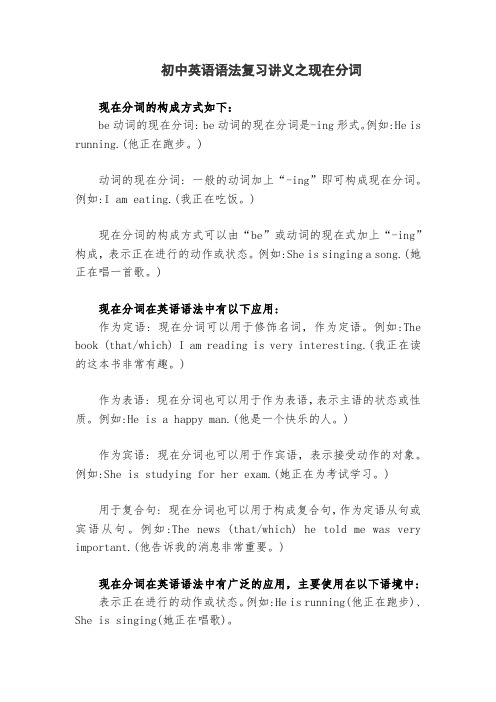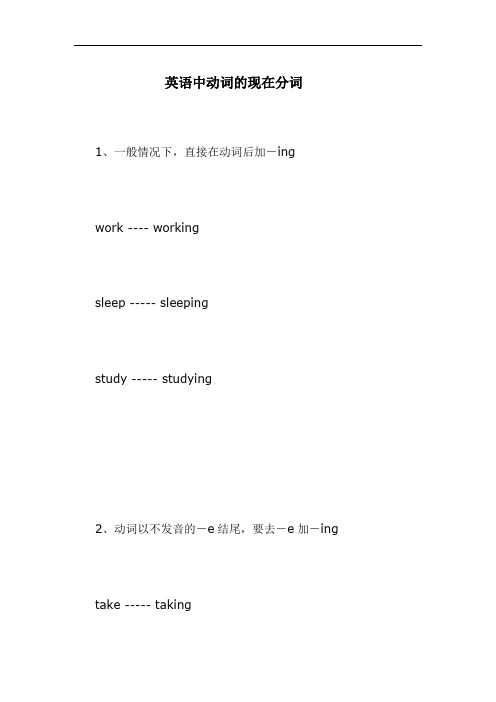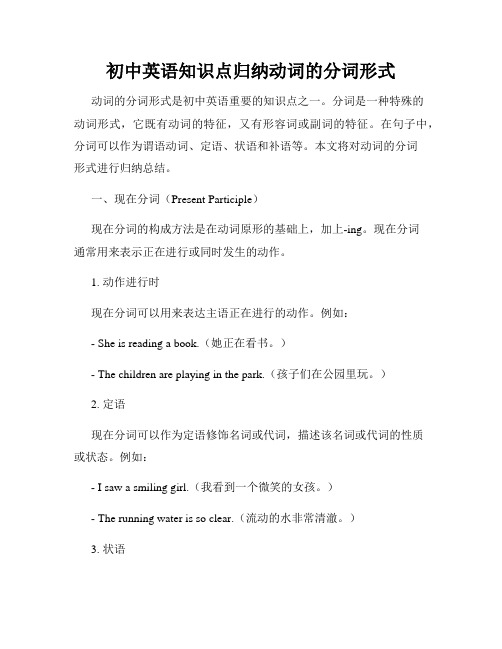写出下例动词的现在分词形式2012.7.24
初中英语语法复习讲义之现在分词

初中英语语法复习讲义之现在分词现在分词的构成方式如下:be动词的现在分词: be动词的现在分词是-ing形式。
例如:He is running.(他正在跑步。
)动词的现在分词: 一般的动词加上“-ing”即可构成现在分词。
例如:I am eating.(我正在吃饭。
)现在分词的构成方式可以由“be”或动词的现在式加上“-ing”构成,表示正在进行的动作或状态。
例如:She is singing a song.(她正在唱一首歌。
)现在分词在英语语法中有以下应用:作为定语: 现在分词可以用于修饰名词,作为定语。
例如:The book (that/which) I am reading is very interesting.(我正在读的这本书非常有趣。
)作为表语: 现在分词也可以用于作为表语,表示主语的状态或性质。
例如:He is a happy man.(他是一个快乐的人。
)作为宾语: 现在分词也可以用于作宾语,表示接受动作的对象。
例如:She is studying for her exam.(她正在为考试学习。
)用于复合句: 现在分词也可以用于构成复合句,作为定语从句或宾语从句。
例如:The news (that/which) he told me was very important.(他告诉我的消息非常重要。
)现在分词在英语语法中有广泛的应用,主要使用在以下语境中:表示正在进行的动作或状态。
例如:He is running(他正在跑步)、She is singing(她正在唱歌)。
作为定语修饰名词。
例如:The book (that/which) I am reading is very interesting(我正在读的这本书非常有趣)。
作为表语表示主语的状态或性质。
例如:He is a happy man(他是一个快乐的人)。
作为宾语表示接受动作的对象。
例如:She is studying for her exam(她正在为考试学习)。
动词的现在分词

A: What do you see? B: I see… a a bird dolphin a a monkey rabbit mouse an elephant A: What is it doing? B: It is…
swimming jumping flying
eating
playing running the ball
往树上跑
A woman ____________ is watering (water) the flowers.
给花浇水 A girl_____________(draw). is drawing
What do they want to do?They want catch to______(catch)the bird.
Try to say them out correctly. ( 试一试,看谁 说得准.)
put putting give giving dance dancingsit sitting plantplanting take taking ask asking stop stopping smoking have having smoke fly flying run running swim write writing swimming
动词的现在 分词
动词现在分词 的变化规则
1、一般情况下,直 接在动词后加---ing
work---working sleep---sleeping study---studying
2、动词以不发音的-e 结尾,去-e加---ing
take---taking make---making dance---dancing
are There _______ (be)two men near the house. are working They____________(work) hard now.
动词现在分词的变化规则

动词现在分词的变化规则:Ⅰ. 一般在动词末尾直接加ingⅡ. 以不发音字母e结尾的动词,先去掉e, 再加ing如: skate --- skating have --- havingride --- riding come --- comingmake --- making dance --- dancingwrite --- writingⅢ. 以重读闭音节结尾的动词,中间只有一个元音字母,词尾只有一个辅音字母,应双写末尾的辅音字母,再加ing如: putting running beginningstopping swimming shoppingjogging sitting getting Ⅳ. 以ie结尾的动词,把ie变成y再加ing如: lie --- lyingtie --- tyingdie --- dying一般现在时动词第三人称单数的变化规则1、一般情况下,动词后直接加s,如:works,gets,reads等。
2、以s,x,ch,sh或o结尾的动词,在后面加es,如:goes,teaches,washes等。
3、以辅音字母加y结尾的动词,把y变为i,再加es,如:study--studies,try--tries,carry--carries等。
4、动词have遇在主语是第三人称单数时,have改为has,如:He has an interesting book .5、动词be遇有主语是第一人称单数时,be改为am,遇有主语是第二人称时,be改为are,遇有主语是第三人称单数时,be改为is。
一、动词第三人称单数的变化规则及发音规律动词原形变第三人称单数的规则与发音规律同名词单数变复数大致相同,请认真观察。
1、大多数动词在词尾加“S”在清辅音后发音为[s],在浊辅音及元音后发音为 [z]。
在t 后读[ts],在d后读[dz],如:①stop-stops [s] ; make-makes [s]②read-reads [z] ; play-plays [z]2、以辅音字母加“y”结尾的,要先将“y”变为“i”,然后在加“es”读[iz] 如:fly-flies [z]; carry-carries [z]study-studies [z]; worry-worries3、以“s, x, ch, sh”结尾的,在词尾加“es”,发音为[iz] 如:teach-teaches [iz]; watch-watches [iz]4、以“o”结尾的动词,加“es”,读[z] 如:go-goes [z] do-does [z]下面几个动词变为单数时,原词的元音部分的发音发生了较大的变化,请注意记忆。
初中英语知识点归纳动词的现在分词形式

初中英语知识点归纳动词的现在分词形式动词的现在分词形式是英语学习中的一个重要知识点。
现在分词是动词的一种非谓语形式,在句子中可以充当主语、宾语、定语、状语等多种语法成分。
本文将对初中英语中常用的动词的现在分词形式进行归纳总结,以帮助读者更好地掌握这一知识点。
一、现在分词的构成形式现在分词的构成形式为:动词原形 + -ing,例如:play - playing; read - reading。
二、表示主动意义的动词的现在分词形式1. 一般情况下,表示主动意义的动词的现在分词形式就是动词的原形加上-ing:play - playing;sing - singing;dance - dancing;swim - swimming;run - running;eat - eating;write - writing;study - studying;etc.2. 以不发音的字母e结尾的动词,去掉e后再加-ing:make - making;take - taking;come - coming;give - giving;live - living;etc.3. 以重读闭音节结尾,并且末尾只有一个辅音字母的动词,双写末尾的辅音字母,再加-ing:sit - sitting;put - putting;run - running;etc.4. 以辅音字母+y结尾的动词,将y变为i,再加-ing:study - studying;try - trying;fly - flying;etc.5. 以-ie结尾的动词,改-ie为-y,再加-ing:die - dying;lie - lying;tie - tying;etc.三、表示被动意义的动词的现在分词形式表示被动意义的动词的现在分词形式由"be"(am, is, are, was, were)+ 动词的过去分词构成:1. play - being played;2. sing - being sung;3. dance - being danced;4. swim - being swum;5. run - being run;6. eat - being eaten;7. write - being written;8. study - being studied;9. etc.四、表示完成意义的动词的现在分词形式表示完成意义的动词的现在分词形式由"have/has/had" + 动词的过去分词构成:1. play - having played;2. sing - having sung;3. dance - having danced;4. swim - having swum;5. run - having run;6. eat - having eaten;7. write - having written;8. study - having studied;9. etc.五、常见动词的现在分词形式总结以下是一些常见动词的现在分词形式的归纳总结:1. doing(do的现在分词)2. going(go的现在分词)3. saying(say的现在分词)4. getting(get的现在分词)5. making(make的现在分词)6. taking(take的现在分词)7. sleeping(sleep的现在分词)8. reading(read的现在分词)9. watching(watch的现在分词)10. writing(write的现在分词)11. running(run的现在分词)12. swimming(swim的现在分词)13. eating(eat的现在分词)14. studying(study的现在分词)15. etc.通过对常见动词的现在分词形式的归纳总结,我们可以更好地掌握动词的现在分词形式的构成规则,提升我们在英语学习中的应用能力和写作能力。
写出下列动词的现在分词

、写出下列动词的现在分词:play______run__________swim________make_______go________like________write________ski_______read________have_______sing_______dance_______put______see_____buy______love_________ _live_______take________come________get________stop________sit________begin________shop_________ _二、用所给的动词的正确形式填空:1.The boy __________________ ( draw)a picture now.2. Listen .Some girls __________( sing)in the classroom .3. My mother ____________ ( cook )some nice food now.4. What _____ you ______ ( do ) now?5. Look . They _____________( have) an English lesson .6.They ____________(not ,water) the flowers now.7.Look! the girls ____________(dance )in the classroom .8.What is our granddaughter doing?She _________(listen ) to music.9. It's 5 o'clock now. We ___________(have)supper now10.______Helen__________(wash )clothes? Yes ,she is三、句型转换:1. They are doing housework .(分别改成一般疑问句和否定句)①_______________________________________________②_______________________________________________2.The students are cleaning the classroom . ( 改一般疑问句并作肯定和否定回答)①_______________________________________________②_ ___________________________________③_____________________________3.I'm playing the football in the playground .(改为否定句)________________________________________________4.Tom is reading books in his study . (改为一般疑问句)________________________________________________5. My mother is cooking some nice food now. ( 改一般疑问句并作肯定和否定回答)①_______________________________________________②_ ___________________________________③_____________________________6.They are not watering the flowers now. (改为肯定句)现在进行时态提高题一.填空题1.Mr Zheng _______________ (read) a book now.2. The rabbits _________________ (jump) now.3.. Look ! Tom and Jo(转载自出国留学网,请保留此信息。
英语中动词的现在分词

英语中动词的现在分词
1、一般情况下,直接在动词后加-ing
work ---- working
sleep ----- sleeping
study ----- studying
2、动词以不发音的-e结尾,要去-e加-ing take ----- taking
make ----- making
dance ----- dancing
3、重读闭音节的动词,要双写词尾字母,再加-ing cut ----- cutting
put ----- putting
begin ------ beginning
4、以-ie结尾的动词,把变成y再加-ing
lie ----- lying
tie ----- tying
die ----- dying
口诀:现在进行ing,以e 结尾要去e,除去几个特殊词,系住tie-tying死去die-dying要躺下lie-lying,直接ie变成y,
需要双写加ing的词,请背下来!
swim-swimming run-running put-putting sit-sitting begin-beginning plan-planning
cut-cutting get-getting shop-shopping chat-chatting stop-stopping regret-regretting
dig-digging prefer-preferring trek-trekking
规则:1.必须是重读音节(一个音节的词,本身就是重读音节)
2.必须是闭音节(以一个或几个辅音字母(r 除外)结尾而中间只有一个元音字母的音节,称为闭音节)。
初中英语知识点归纳动词的分词形式

初中英语知识点归纳动词的分词形式动词的分词形式是初中英语重要的知识点之一。
分词是一种特殊的动词形式,它既有动词的特征,又有形容词或副词的特征。
在句子中,分词可以作为谓语动词、定语、状语和补语等。
本文将对动词的分词形式进行归纳总结。
一、现在分词(Present Participle)现在分词的构成方法是在动词原形的基础上,加上-ing。
现在分词通常用来表示正在进行或同时发生的动作。
1. 动作进行时现在分词可以用来表达主语正在进行的动作。
例如:- She is reading a book.(她正在看书。
)- The children are playing in the park.(孩子们在公园里玩。
)2. 定语现在分词可以作为定语修饰名词或代词,描述该名词或代词的性质或状态。
例如:- I saw a smiling girl.(我看到一个微笑的女孩。
)- The running water is so clear.(流动的水非常清澈。
)3. 状语现在分词可以作为状语修饰整个句子或句子中的动词,表示附加的信息。
例如:- He left the room, slamming the door behind him.(他离开房间的时候,砰地关上了门。
)- While studying, don't forget to take breaks.(学习的时候,别忘了休息。
)二、过去分词(Past Participle)过去分词的构成方法有多种,常见的有以下几种形式:动词加-ed、动词的第三形式(不规则动词)、部分动词短语等。
过去分词通常用来表示完成的动作或已经发生的动作。
1. 被动语态过去分词常用于构成被动语态,表示动作的接受者或受害者。
例如:- The car was repaired by a professional mechanic.(汽车被一位专业的机修师修好了。
)- The cake was eaten by the kids.(蛋糕被孩子们吃掉了。
动词的现在分词

动词的现在分词标准化管理部编码-[99968T-6889628-J68568-1689N]动词的现在分词(-ing)规则现在分词的构成方法(1)一般情况下,在动词后加-ing构成:work--working,sleep--sleeping,wait--waiting等。
(2)在不发音的-e结尾动词去掉e后再加-ing:smile--smiling,move-movingtake-takingmake--making等。
(3)以重读闭音节或r音节结尾且末尾只有一个辅音字母动词,要双写末尾的辅音字母再加-ing:sit--sitting,plan--planning,refer--referring,occur—occurring,begin—beginning,beg—begging,cut—cutting,get—getting,hit—hitting,let—letting,swim-swimming,permit-permittingstop-stopping,drop-dropping,dig-digging,win-winning,run-running,put-putting,admit-admitting,shop--shopping,fit--fitting,forget--forgetting,spit--spitting(4)以字母ie结尾的动词,通常将ie改为y,再加ing:die--dying,lie--lying,tie--tying等。
【注】(1)以字母l结尾动词,若末尾一个音节为重读音节,则必须双写l 再加ing,如control--controlling,但若末尾一个音节为非重读音节,则可双写l(英国英语)或不双写l(美国英语),如:travel—traveling/travelling。
(2)动词picnic(野餐)的现在分词为picnicking,不是picnicing。
- 1、下载文档前请自行甄别文档内容的完整性,平台不提供额外的编辑、内容补充、找答案等附加服务。
- 2、"仅部分预览"的文档,不可在线预览部分如存在完整性等问题,可反馈申请退款(可完整预览的文档不适用该条件!)。
- 3、如文档侵犯您的权益,请联系客服反馈,我们会尽快为您处理(人工客服工作时间:9:00-18:30)。
现在进行时一、写出下例动词的现在分词形式1)give____ 2)use____ 3)move____ 4)skate____ 5)draw____ 6)tell____ 7)ring____ 8)wear____ 9)get____ 10)put____ 11)hit____ 12)stop____ 13)keep____ 14)hurt____ 15)know____ 16)lie____ 17)die____ 18)begin____ 19)forget____ 20)save____ 21)close____ 22)see____ 23)carry____二、用现在进行时连写句子1)Li Ping; learn; to; speak; English; 2)it; rain; now3)they;watch;a football match;on TV 4)he;look;out of the window;5)look;the dog;sleep; 6)listen;the baby;cry;7)they;have a meeting;at seven o'clock8)the students;prepare for;an English test;now;三、将下例句子改成一般疑问句1)Mike is climbing the hill. 2)We are having an English lesson now. 3)Li Ping is jumping like a monkey.4)The students are reading the text now.5)I am studying English. 6)He is closing the window.四、对划线部分提问1)The baby is listening to the music. 2)I am looking for a jacket for my son. 3)She is smiling to herself in the mirror.(镜子)4)The boys are visiting the history museum.5)The old man is sleeping right now. 6)The cats are running up the trees. 7)The children are listening to the teacher of English.五、将下例句子改成否定句1)The woman is making a cake in the kitchen. 2)We are having lunch now. 3)The boy is waiting for his mother under the big tree.4)You are playing the violin. 6)The students are doing their homework now.六、用动词的正确时态填空1)I________(talk).You________(listen)to me now.2)Look, the boy__________(run)fast.3)----What are you doing? ----I_________(do) my homework.4)----_______the students_______(read) English. ----Yes ,they are.5)Tom_______(not study)English.He is studying Chinese.6)----Who_______(sing)a song? ---Li Ying is.7)The girl_______(not eat)bananas now.8)----Where ____ they____(stand)? ----They are standing over there.9)Look! The boy over there_______(ply) a model plane.10)----What is Meimei doing now? ----She______(watch)TV with her parents 11)He____(study) English very hard.12)We often____(buy)books and things like that in the shop.13)Polly____(not eat) a banana now.七、单项选择1)Jack is_____ with Jim. They are good____.A.running; friend;B.running; friends;C.running; friendsD.run; friend's 2)Look! Mary____doing____homework.A.is; one'sB. is; herC.are;hisD.are;her3)The Greens____ supper now.A.is havingB. are; havingC.is haveingD.are;having4)The children are____TV.A.watchB. seeingC. watchingD. reading5)Are the boys looking at the blackboard? Yes,they____.A. aren'tB. doC.don'tD.are一般过去时练习题一、单项选择:从下列各题后所给的四个选项中选择最佳答案填空。
( )1.My father ______ill yesterday.A. isn't B. aren't C. wasn't D. weren't( )2.____your parents at home last week﹖A. Is B. Was C. Are D. Were( )3.The twins____in Dalian last year. They____here now.A. are; were B. were; are C. was; are D. were; was( )4. _____your father at work the day____yesterday(前天)﹖A. Was; before B. Is; before C. Was; after D. Is; after ( )5.—Who was on duty last Friday﹖—______A. I am B. I was C. Yes, I was D. No, I wasn't二、请用正确动词形式填空。
1. I _________ (have) an exciting party last weekend.2. _______ she ______(practice) her guitar yesterday? No, she _________.3. What ________ Tom ________ (do) on Saturday evening?He ________(watch) TV and __________(read) an interesting book.4. They all _________(go) to the mountains yesterday morning.5. She _________(not visit) her aunt last weekend.She ________ (stay) at home and _________(do) some cleaning.三、翻译下列句子(20)1. 我过了一个忙碌但却刺激的周末。
I _________ _________ __________ __________ exciting weekend.2. Jenny喜欢看书。
昨晚她看了一本英语书。
Jenny likes _________ __________. She _________ an English book last night.3. Emma每天都看电视。
可是昨天他没有看。
Emma__________ TV every day. But he _________ ________ ________ yesterday.4. 上周六他们做什么了?他们做作业和购物了。
What ________ they _________ _________ Saturday?They _________ __________ homework and _________ __________.四、改写句子:(20)1、Lucy did her homework at home.(改否定句)Lucy ______ ______ her homework at home.2、He found some meat in the fridge(冰箱).(变一般疑问句)___________ he __________ ___________ meat in the fridge?3、There was some orange in the cup.(变一般疑问句)______ there ______ orange in the cup?4. Frank read an interesting book about history. (一般疑问句)_______ Frank _______ an interesting book about history?5. Why not go out for a walk? (同义句) _______ ________ ________ out for a walk?五、改错题(20)1.How is Jane yesterday? _____________________2.He go to school by bus last week. ____________________________3.He often goes home at 6:00 last month. ____________________________4.I can fly kites seven years ago. ______________________________5.Did you saw him just now. ____________________________________二、用some, any填空1.There’s ______ water in the cup. There isn’t ______ tea in the cup.2.Is there ______ bread here ? Yes , there is . There’s ______ on the table.3.Are there ______ cars in front of the building? No, there aren’t.4.There isn’t _____ chocolate on the table.5.Is there ______ soup(汤) on the table?三、用is, are , isn’t , aren’t填空1.There ______ a spoon (勺子) on the plate.2.There ______ some milk on the table . And there _______ any coffee here .3.There ______ some clouds in the sky. There ______ some boats on the river.4. There ______ any knives in the box.5.There ______ a newspaper in the living room.6.______ there any books in the room? Yes, there ______ .______ there any magazines on the television? No, there ______ .7.There ______ a policeman in the kitchen. 8.There ______ 60 minutes in an hour.9.There ______ a pencil, a ruler and two books on the desk.10.There ______ two glasses and a cup on the table.11.What ________ in this box ? There is a present in it .12. What _______ in that box ? There are two clothes in it .四、按要求做题1.There is a teacher in the office . 否定句 ________________________2.Is there a flower on the table ? 肯定回答____________ 肯定回答 __________________3.There are some pens in the box . 一般疑问句 __________________________4.There isn’t any water in the galss . 肯定句 ________________________5.There are two eggs and one cake here . 对划线部分提问 _______________________6.What’s on the box ? (a present) 回答问题 _______________________________7.How many books are there in your bag ? 回答问题 ___________________________8.There is a bird in the tree . 对划线部分提问 _________________________________9. There are lots of people in the par .对划线部分提问 ____________________________10. There is some water in the glass . 对划线部分提问 ____________________________一般疑问句并回答 ________________________________ _ 否定句_______________________________11.We are going to play ping-pong on Saturday.一般疑问句及回答___________________ 12.He's going to tell a story.否定句____________________________________ 13.She is going to work hard this term . 对划线部分提问 _______________________ 14.They're going to the park by bus.(对划线部分提问) _____________________ 15.The students have a trip on Sunday.用next Sunday改写 ______________________ 16.Linda has lunch at school on Tuesdays.用next Tuesday改写 ____________________将来时练习:一、用所给词的适当形式填空。
